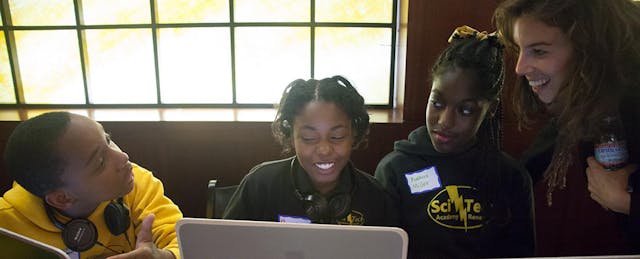Kid instructors. Community-based human capital investments. DIY STEM curricula. Architectural design fellowships. Such were the case studies being presented to a room of educators, parents, non-profit staffers, and job seekers at the Smart Cities Showcase, a one-of-a-kind, science fair-style forum featuring organizations that will bring New Orleans into the next decade of school innovation.
Inspired by Tom Vander Ark’s Smart Cities: 7 Keys to Education and Employment, the showcase was a part of a day long event hosted by 4.0 Schools and Getting Smart. Over a dozen organizations set up tables with literature and laptops, representing three major themes that I believe will carry New Orleans into the next decade.
“And the Children Shall Lead”

“And the children shall lead,” as the third-season Star Trek episode so aptly said.
Attendees of the Smart Cities Summit were inspired by students from SciTech Academy (the flagship academy for STEM programs at RENEW schools), where three students demonstrated the school’s proprietary blended learning curriculum to adult attendees. “It’s their program, they are the ones people should hear from,” commented Alex Perez, principal at SciTech Academy.
Following SciTech’s lead was MakerKrewe (featured in the photo above), which makes DIY STEM projects more accessible for kids through creating all-inclusive, pop-up maker spaces at schools and gatherings.
A More Diverse Workforce
Journalists around the country have been documenting the trend among tech companies to publish data on the diversity of their workforce. In education, Teach for America recently chimed in, touting an increase in the diversity of its latest teaching corps.
Both of these trends have provoked a strong response from up-and-coming organizations to make diversity a core tenet of their culture. For the past two years, Enriched, a community-based human capital platform, partners with schools and companies to place local professionals into part-time and full-time roles. At the showcase, two of their guest educators explained their unique approach to creating new job opportunities for underrepresented groups via Enriched’s two-sided marketplace for freelancers and education organizations.
One table down was a non-profit seed fund, Camelback Ventures, dedicated to increasing minority entrepreneurs in education. Named after the historic architectural layout in New Orleans, the group runs an annual fellowship for early-stage entrepreneurs of color to develop the skills needed to attack large-scale education problems through technology.
Taking a different angle on alternative teacher certification and diversity, Brothers Empowered 2 Teach is building relationships with high schools and colleges to expose young men of color to careers in the classroom. Through a 3-year fellowship, college sophomores and juniors gain hands-on tutoring and mentoring experience through partner schools in the community, along with a historical and social context for the importance of dedicating their careers to helping students.
Real-World Skill Development
With this medley of opportunities to learn new information and skills, our schools and children can be nimble enough to respond to the new jobs that arise in the future--opportunities that we won’t know of today.
What used to be reserved for graduate programs and professional apprenticeships is now being made available to kids as young as 6 years old. Take design thinking, for example. Most of us only learn about it during college or afterwards. But imagine what would be possible if kids had 15+ years of experience with this mindset before entering the workforce.
That’s what Jose Cotto is doing as Director of Student-Centered and Community-Based Learning at St. Martin’s Episcopal’s IdeaLab, which brought students from their lower and upper schools (read elementary and high schools) to share their experience applying design thinking to real-world problems.
And when it comes to Louisiana’s workforce, the national trend of STEM jobs outnumbering talent persists. Operation Spark, a non-profit coding bootcamp for teens, has responded to the need to fill 3,000 software engineering jobs in the Greater New Orleans area.
With all of the talk of coding and and design thinking in the air, it was also refreshing to learn more about NOMA Louisiana (NOMALA)’s Project Pipeline, which focuses on an underrepresented aspect of STEM: architectural design. The organization offers New Orleans youth a summer camp, competition and mentorship program to introduce them to the world of architecture and design, hosted by the Tulane University and Louisiana State University Schools of Architecture.
Being born and raised in New Orleans, I’m certainly thrilled to see my city stack up with (and even outpace) the Silicon Valleys of the world when it comes to education innovation. But that’s just my feisty nature. When it comes to our kids, there is no competition. We’re all in this boat together.


